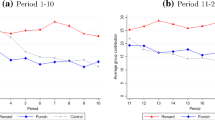Abstract
Generally, with a standard linear public goods game, one observes at the aggregate level that contributions lay between the Nash equilibrium and the social optimum and decrease over time with and end-effect. The purpose of this paper is to see whether these general aggregate results remain available at the group and at the individual levels.
At this purpose, six groups of four persons were formed and made to play a public goods game. At the aggregate level, it was found that obtained results corresponded almost to the standard experimental findings in the literature.
Using the classification by Isaac, Walker and Thomas ({dy1984}), it was found that at the group level only two groups adopted the standard behaviour and only two groups presented a behaviour similar to what it was obtained at the aggregate level.
At the individual level, contributions over time of each subject to the group were compared to the aggregate results and classified into types. Only in one of the six groups individuals adopted an homogeneous behaviour, meantime in the other five groups individuals conducted different behaviours.
Similar content being viewed by others
References
Anderson, S.P.; Goeree, J.K. and Holt, C.A. (1998): A Theoretical Analysis of Altruism and Decision Error in Public Goods Games.Journal of Public Economics, vol. 70, no 2, pp. 297–323.
Andreoni, J. (1988): Why Free Ride? Strategies and Learning in Public Goods Experiments.Journal of Public Economics, vol. 37, no 3, pp. 291–304.
Andreoni, J. (1990): Impure Altruism and Donations to Public Goods: A Theory of Warm-Glow Giving?Economic Journal, vol. 100, pp. 464–477.
Andreoni, J. (1995): Cooperation in Public-Goods Experiments: Kindness or Confusion?American Economic Review, vol. 85, no 4, pp. 891–904.
Chan; Godby; Mestelman and Muller (1997): Equity Theory and the Voluntary Provision of Public Goods.Journal of Econometric Behavior and Organization, vol. 32.
Croson, R.T.A. (1996): Partners and Strangers Revisited.Economic Letters, vol. 53, pp. 25–32.
Davis, D.D. and Holt., C.A. (1993):Experimental Economics. Princeton (New Jersey): Princeton University Press.
Erev, I. and Roth, A. (1998): Predicting How People Play Games: Reinforcement Learning in Experimental Games with Unique, Mixed Strategy Equilibria.American Economic Review, vol. 88, no 4, pp. 848–881.
Fischbacher, U. (1999):z-Tree: Zurich Toolbox for Readymade Economic Experiments. Experimenter’s Manual. Working Paper no 21, Institute for Empirical Research in Economics, University of Zurich.
Fischbacher, U.; Gätcher, S. and Feehr, E. (2001): Are People Conditionally Cooperative? Evidence from a Public Goods Experiment.Economic Letters, vol. 71, no 3, pp. 397–404.
Hichri, W. (2004): Interior Collective Optimum in a Voluntary Contribution to a Public Goods Game.Applied Economics Letters, vol. 11,no 3, pp. 135–140.
Ho, T.H.; Camerer, C.F. and Wang, X. (2002):Individual Differences in EWA Learning with Partial Payoff Indication. Working Paper. Available at [http://www.hss.caltech.edu/~camerer/camerer.html].
Isaac, M. and Walker, J. (1998): Nash as an Organizing Principle in the Voluntary Provision of Public Goods: Experimental Evidence.Experimental Economics, vol. 1, no 3, pp. 191–206.
Isaac, M.; Walker, J. and Thomas, S. (1984): Divergent Evidence on Free Riding: An Experimental Examination of Possible Explanations.Public Choice, vol. 40, no 4, pp. 113–149.
Keser, C. (1996): Voluntary Contributions to a Public Good when Partial Contribution Is a Dominant Strategy.Economic Letters, vol. 50, no 3, pp. 359–366.
Keser, C. (2002): Cooperation in Public Goods Experiments. In Bolle, F. and Lehmann-Waffenschmidt, M. (eds.)Surveys in Experimental Economics: Bargaining, Cooperation and Election Stock Markets. Wien: Physica- Verlag, pp. 71–90.
Keser, C. and Gardner, R. (1999): Strategic Behavior of Experienced Subjects in a Common Pool Resource Game.International Journal of Game Theory, vol. 28, no 2, pp. 241–252.
Leylard, J.O. (1995): Public Goods: A Survey of Experimental Research. In Kagel, J. and Roth, A. (eds.)The Handbook of Experimental Economics. Princeton (New Jersey): Princeton University Press, pp. 111–194.
Palfrey, T. and Prisbey, J. (1997): Anomalous Behavior in Linear Public Goods Experiments: How Much and Why?American Economic Review, vol. 87, no 4, pp. 829–846.
Sefton, M. and Steinberg, R. (1996): Reward Structures in Public Goods Experiments.Journal of Public Economics, vol. 61, pp. 263–287.
Willinger, M. and Ziegelmeyer, A. (2001): Strength of the Social Dilemma in a Public Goods Experiment: An Exploration of the Error Hypothesis.Experimental Economics, vol. 4, no 2, pp. 131–134.
Author information
Authors and Affiliations
Corresponding author
Additional information
Author is indebted to Alan Kirman for the supervision of this work and to Sylvie Thoron for her helpful advises. He also thanks Jordi Brandts for his help during his stay in Barcelona and Antoni Bosch for making theLeeX available for him.
Rights and permissions
About this article
Cite this article
Hichri, W. The individual behaviour in a public goods game. Int Rev Public Nonprofit Mark 2, 59–71 (2005). https://doi.org/10.1007/BF02893251
Received:
Accepted:
Issue Date:
DOI: https://doi.org/10.1007/BF02893251




